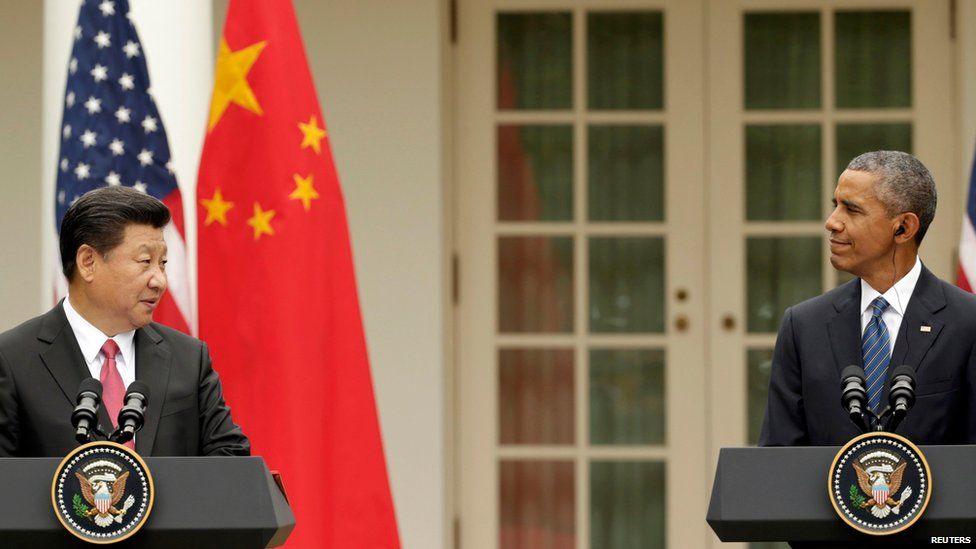China's Xi wants 'win-win co-operation' with US
- Published

China's President Xi Jinping has called for "win-win co-operation" with the US on his first state visit to Washington.
Speaking on the White House lawn, he said the relationship with the US "must adapt to the changing times".
He was welcomed by President Barack Obama, who said the two nations "had an unmatched ability to shape the course of the world" if they worked together.
Mr Xi is later expected to make a landmark pledge on climate change and on curbing harmful emissions.
The Chinese and US presidents held informal talks at the White House on Thursday, where they discussed Iran's nuclear programme. Mr Xi's visit has been overshadowed by an ongoing row over cyber security.
Xi Jinping's US visit
- Carbon trading: How does it work?
- Cyber attacks: Cyber-suspicion strains US-China relations
- 'Golden relationship': Can China be the 'best partner in the West'?
- Cement and pigs - China's astounding transformation in statistics and infographics
- Who is Xi Dada? - Newspaper's promotional video raises eyebrows
- House of Cards and other quirky elements of Xi's speech
Speaking at a welcome event on the White House lawn on Friday, both the US and Chinese leaders emphasised the benefits of closer co-operation.
Mr Obama said the US wanted to see the "rise of a China that is stable, prosperous and peaceful".
Mr Xi meanwhile said the two countries had "no choice but to seek win-win co-operation", and called for building "a new model of major country relations".
Emissions pledge
A White House official told reporters that Mr Xi would announce on Friday plans to launch a national carbon emissions trading scheme in 2017.
The "cap-and-trade" scheme would see Chinese companies charged to emit pollutants beyond a certain level.
Four views from Washington of Chinese president Xi Jinping's visit to the US
China would also make a "very substantial financial commitment" to developing nations to help them move to low-polluting technologies, the Associated Press news agency quoted the official as saying.
The expected Chinese announcement follows on from a joint US-China climate pledge in late 2014.
Then, Mr Obama set a new goal of reducing US levels by between 26%-28% by 2025, compared with 2005 levels. China did not set a specific target, but said emissions would peak by 2030.
Analysis: Matt McGrath, BBC environment correspondent
Setting up a national carbon trading scheme is a big step forward for China, but its immediate impact will be political rather than practical.
The announcement draws the sting from one of the biggest objections put up by Mr Obama's Republican opponents: that the US shouldn't sign up to strict carbon limits while its biggest trading partner does nothing.
The impact of the cap-and-trade scheme on the ground, or in the air in China, is more difficult to predict. China has seven regional pilot schemes now running but they have had teething difficulties and Friday's announcement will see the national system come into force a year later than originally planned. There are worries too about corruption and oversight.
And Europe's experience with a carbon trading scheme has been fraught - too many permits given away for free have diluted both the carbon price and the impact of the scheme. Despite this, the Chinese announcement puts flesh on the bones of their plans to peak carbon by 2030. And that will make a strong global climate treaty in Paris this December more likely.
The two countries together produce about 45% of the world's carbon dioxide.
The announcement comes ahead of a major UN climate change summit in Paris later this year, and is one of the few breakthroughs expected during Mr Xi's visit.
Little progress is expected on contentious issues including cyber security and China's territorial ambitions in South East Asia.
Mr Xi is arriving in Washington from Seattle, where he met leaders of the business and technology world, promising to strengthen protections on intellectual property and clear obstacles to investment in China.
The US has recently alleged that the Chinese state was behind a massive data security breach of government databases as well as attacks on private firms, and Mr Obama has said the issue risks putting "significant strains" on the important relationship.
Mr Xi said in Seattle China was "a strong defender of cyber security" as well as a "victim of hacking", though promised to work with the US on the issue.
White House spokesman Josh Earnest told reporters on Thursday: "We put more stock in their actions than their words."
- Published21 September 2015
- Published24 September 2015
- Published23 September 2015